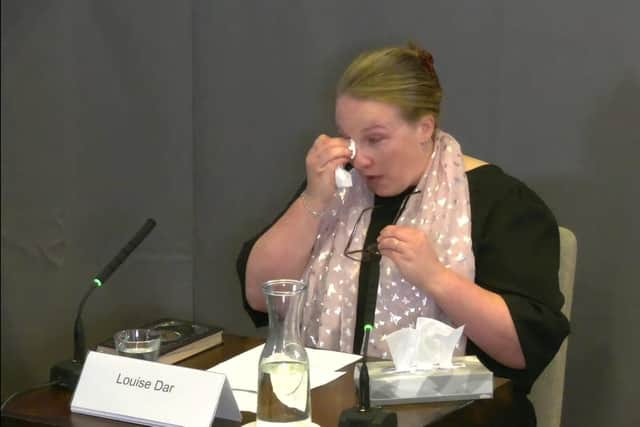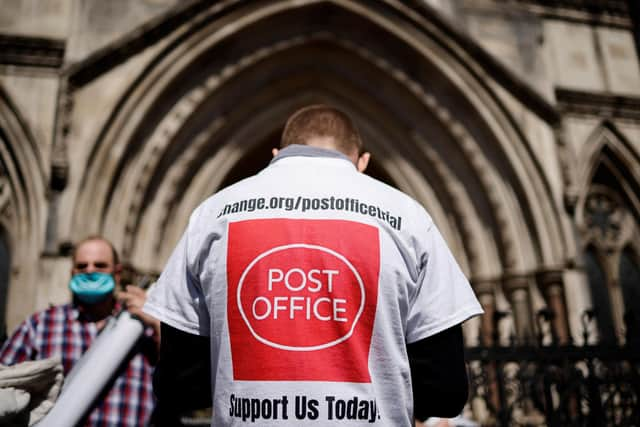Post Office Horizon scandal: 'I'd wake up at night asking what will I do, what can I do?' - former sub-postmasters tell inquiry of 'devastating' impact.
In the first Scottish hearing of the public inquiry into the long-running scandal, those who ran Post Office branches told of how they were forced to remortgage their houses and cash in pensions to meet crippling debts caused by problems with the accounting system.
In a day of emotional testimony, others told of how the scandal cost them their marriages, and even led to them contemplating committing suicide as they were harangued to repay debts for which they were not responsible.
Advertisement
Hide AdAdvertisement
Hide AdThe human impact hearing of the inquiry, which is being led by retired high court judge, Sir Wyn Williams, heard from Keith Macaldowie, a 49-year-old who paid in excess of £15,000 to the Post Office due to Horizon shortfalls.
The father-of-two, who worked as a sub-postmaster in Greenock, Inverclyde, between 2006 and 2011, said he had to remortgage his home and borrow from his mother-in-law, for fear of not paying.
Mr Macaldowie, who was told the matter would not be taken further if he resigned, said the stress of the situation cost him his marriage, and that he came close to committing suicide.
More than a decade on, he is still in debt, reliant on benefits, and said the episode had irrevocably changed his relationship with his children.
“For several years now, they’ve more or less not had a dad,” he explained. “I’ve more or less become a recluse when I’m not out working.”


Peter Worsfold, a 77-year-old former sub-postmaster from Inverness, told the inquiry how he was confronted at home by two “burly” security officers from the Post Office after one of several large shortfalls were flagged at his branch in the city’s Muirtown area.
Mr Worsfold said he was told he was being investigated for false accounting, fraud and theft, with the security officers telling him to pay up to remedy the deficit.
“If I didn’t, they said I’d probably face imprisonment,” he told the inquiry. “I gave them cash. I felt humiliated and confused.”


Advertisement
Hide AdAdvertisement
Hide AdIn all, Mr Worsfold had to pay the Post Office more than £37,000 to make up for the shortfalls, but said the real price was even greater. “It was totally devastating,” the father-of-three said. “I had to cash in my pensions and remortgage my house to pay off the debts.”
Mr Worsfold, who was suspended and ultimately had his contract with the Post Office terminated, said he had called in the police, and even sacked two members of his staff, amid efforts to identify where the money had gone.
In what constitutes the most widespread miscarriage of justice in British legal history, some 736 sub-postmasters and sub-postmistresses were wrongly accused of theft, fraud, and false accounting between 2000 and 2014 due to the Horizon system, which was installed and maintained by Fujitsu.
Despite repeatedly protesting their innocence, many were convicted and imprisoned, or left with their finances and personal lives in ruins. Some died before their names were cleared.
The latest inquiry hearing, taking place at the Marriott Hotel in Glasgow city centre, also heard testimony from Louise Dar, a 39-year-old who had to pay around £44,000 to the Post Office.
The mother-of-three, who took on the post office in her home town of Lenzie in East Dunbartonshire in November 2014, said the first shortfall of nearly £1,000 emerged during her first day of on-site training, with a Post Office auditor accusing her of taking the money.
Ms Dar said while she and her husband took money from the retail side of their business to make up the shortfalls, the Post Office would also dock their wages.
The former sub-postmistress was suspended twice, with her contract eventually terminated in 2017. She was also ordered to attend a formal interview the day before her mother’s funeral, at which she was accused of stealing.
Advertisement
Hide AdAdvertisement
Hide Ad“We had put our life savings into this business,” she told the inquiry. “My mother-in-law even sold jewellery to support us, and having to watch it be stripped from under us was horrendous.”
Responding to questions from Jason Beer QC, counsel to the inquiry, Ms Dar said “awful” rumours were spread about her family, with her husband also threatened and subjected to racist abuse.
She was one of six lead claimants in a successful High Court case in 2019, which saw a 555-strong group of subpostmasters and mistresses challenge the Post Office.
As a result, she received payments which “hardly touched” on her debts. “It’s not good enough, we shouldn’t be in this position,” she said. “We don’t want a windfall, we just want to get back to zero.”
Also giving evidence was Myra Philp, whose mother, Mary, a former police officer, was a sub-postmistress in Auchtermuchty between 2001 and 2006.
She said they paid more than £70,000 to the Post Office, and the firm told her mother she was the only one experiencing issues with shortfalls. “They stole our money,” she said. “They destroyed my late mother’s life."
Ms Philp also expressed indignation at the continued ambiguity over whether her case is being considered by the historical shortfall compensation scheme. “It adds the ultimate insult to injury,” she said.
Earlier, Vinod Sharma, a retired subpostmaster, told the inquiry he felt he had no option but to pay nearly £29,000 after the IT system identified a major shortfall at the Post Office branch he ran in Balornock in the north of Glasgow.
Advertisement
Hide AdAdvertisement
Hide AdThe 74-year-old said auditors from the Post Office implied his assistant had stolen the money after the deficit came to light in 2015.
“That’s not the kind of money you can save that easily, and I’d wake up in the middle of the night, asking ‘what will I do? What can I do?’” he explained.
The inquiry continues.
Comments
Want to join the conversation? Please or to comment on this article.
